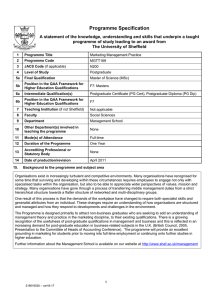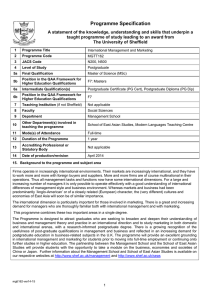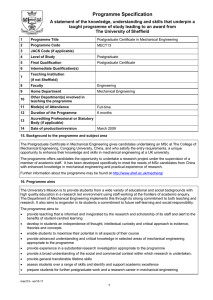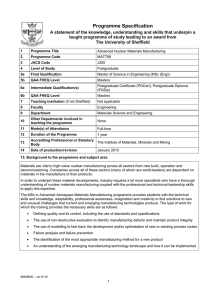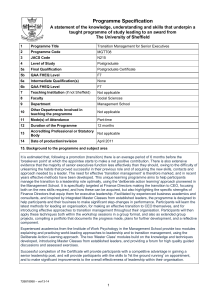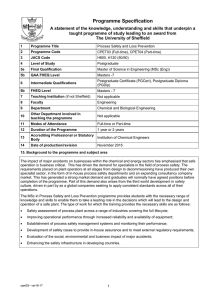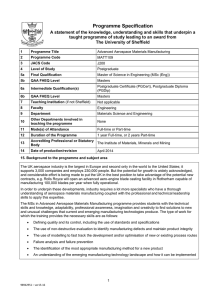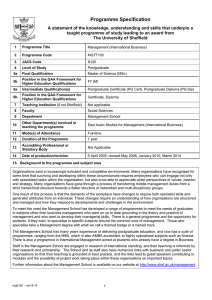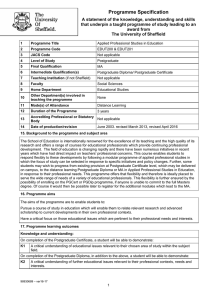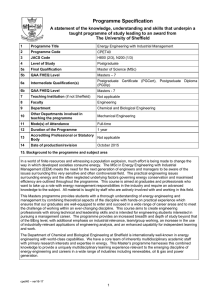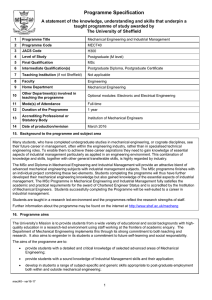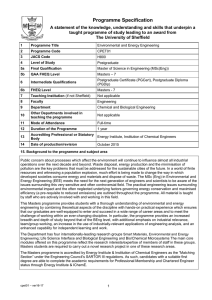1 Programme Title 2
advertisement
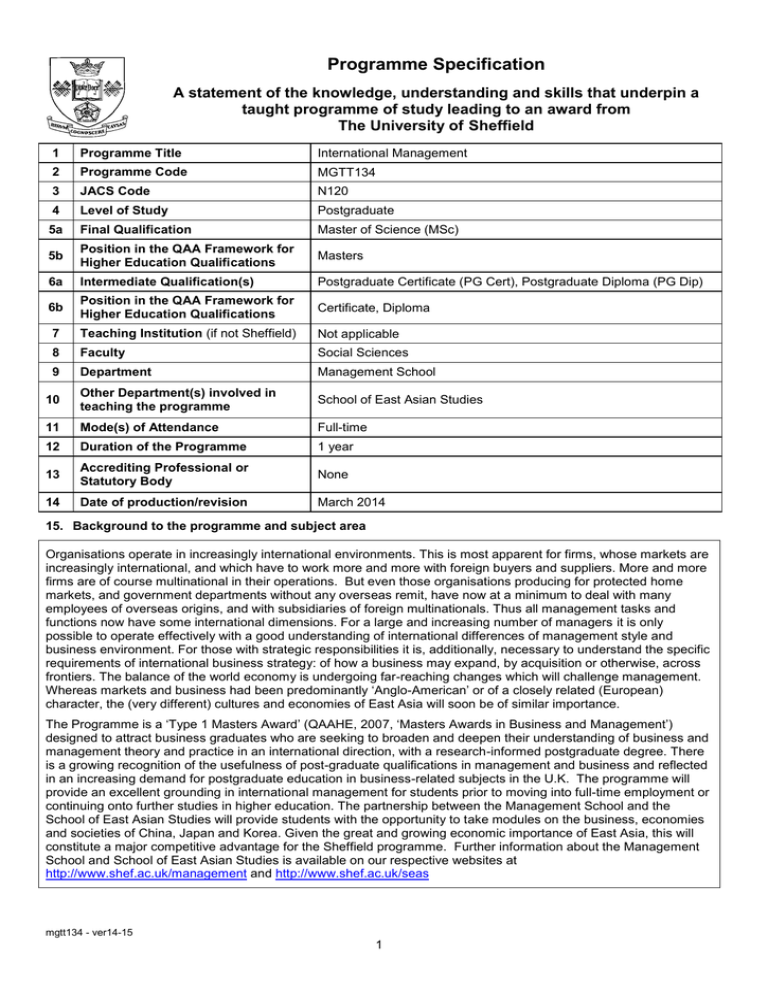
Programme Specification A statement of the knowledge, understanding and skills that underpin a taught programme of study leading to an award from The University of Sheffield 1 Programme Title International Management 2 Programme Code MGTT134 3 JACS Code N120 4 Level of Study Postgraduate 5a Final Qualification Master of Science (MSc) 5b Position in the QAA Framework for Higher Education Qualifications Masters 6a Intermediate Qualification(s) Postgraduate Certificate (PG Cert), Postgraduate Diploma (PG Dip) 6b Position in the QAA Framework for Higher Education Qualifications Certificate, Diploma 7 Teaching Institution (if not Sheffield) Not applicable 8 Faculty Social Sciences 9 Department Management School 10 Other Department(s) involved in teaching the programme School of East Asian Studies 11 Mode(s) of Attendance Full-time 12 Duration of the Programme 1 year 13 Accrediting Professional or Statutory Body None 14 Date of production/revision March 2014 15. Background to the programme and subject area Organisations operate in increasingly international environments. This is most apparent for firms, whose markets are increasingly international, and which have to work more and more with foreign buyers and suppliers. More and more firms are of course multinational in their operations. But even those organisations producing for protected home markets, and government departments without any overseas remit, have now at a minimum to deal with many employees of overseas origins, and with subsidiaries of foreign multinationals. Thus all management tasks and functions now have some international dimensions. For a large and increasing number of managers it is only possible to operate effectively with a good understanding of international differences of management style and business environment. For those with strategic responsibilities it is, additionally, necessary to understand the specific requirements of international business strategy: of how a business may expand, by acquisition or otherwise, across frontiers. The balance of the world economy is undergoing far-reaching changes which will challenge management. Whereas markets and business had been predominantly ‘Anglo-American’ or of a closely related (European) character, the (very different) cultures and economies of East Asia will soon be of similar importance. The Programme is a ‘Type 1 Masters Award’ (QAAHE, 2007, ‘Masters Awards in Business and Management’) designed to attract business graduates who are seeking to broaden and deepen their understanding of business and management theory and practice in an international direction, with a research-informed postgraduate degree. There is a growing recognition of the usefulness of post-graduate qualifications in management and business and reflected in an increasing demand for postgraduate education in business-related subjects in the U.K. The programme will provide an excellent grounding in international management for students prior to moving into full-time employment or continuing onto further studies in higher education. The partnership between the Management School and the School of East Asian Studies will provide students with the opportunity to take modules on the business, economies and societies of China, Japan and Korea. Given the great and growing economic importance of East Asia, this will constitute a major competitive advantage for the Sheffield programme. Further information about the Management School and School of East Asian Studies is available on our respective websites at http://www.shef.ac.uk/management and http://www.shef.ac.uk/seas mgtt134 - ver14-15 1 16. Programme aims The MSc in International Management programme aims to: 1. develop students’ understanding of the ‘area study’ of business and management and the differences of culture, business practice and economic circumstances which provide the context for management in different countries and regions of the world; and of the implications of these differences for the choice of management strategies. 2. develop students’ understanding of the principles and practices of international business, to enable them to identify and critically evaluate alternative strategies for international business development. 3. develop students’ understanding of and ability to conduct rigorous research through independent work and leading to the submission of a management report. 4. provide students with knowledge and skills appropriate to commence a career associated with the management of organisational activities, and with a strong international dimension. The aims of the PG Certificate in International Management are the same as items 1 and 2 above except that the opportunities to gain breadth of knowledge and understanding would be significantly reduced. The aims of the PG Diploma in International Management are the same as items 1 and 2. The opportunities under items 3 and 4 would be reduced by the absence of completion of either the full range of modules or the management report. 17. Programme learning outcomes Knowledge and understanding: On completion of the PG Certificate in International Management, students will be able to demonstrate a critical understanding of relevant knowledge related to: K1 The practices and economic and social context of business and management in Europe. K2 The practices and economic and social context of business and management in East Asia. K3 The institutions of the European Union relevant to business and management. K4 A disciplinary area of management, or the social and economic context of business. In addition to the above, on completion of the PG Diploma in International Management, students will be able to demonstrate a critical understanding of relevant knowledge related to: K5 The principles and practice of international business development. K6 The principles and practice of international management. K7 The principal methods of research relevant to the management of organisations and their environment; an ability to critically evaluate this research and where appropriate propose new hypotheses. K8 Selected theories and practices of international management and its social and economic context, depending upon the chosen elective modules. In addition to the above, on completion of the MSc in International Management, students will be able to demonstrate: K9 An advanced knowledge and critical understanding, displaying originality, depth and insight, of a specialist area of study at the forefront of the field of international management. Skills and other attributes: On completion of the PG Certificate and PG Diploma in International Management, students will be able to demonstrate ability to: S1 Apply creative and critical methods of appraisal in the context of the international management of organisations. S2 Identify and use relevant information for analysis and decision making in a managerial context. S3 Communicate effectively using a variety of forms within both individual and group-based assignments. S4 Analyse problems relating to the management of business and other organisations operating in an international context, using appropriate concepts, theories and techniques. In addition to the above, on completion of the MSc in International Management students will be able to demonstrate the ability to: mgtt134 - ver14-15 2 S5 Complete successfully an independent research study in a specific area of international management, involving the skills of designing a research study, choosing appropriate methodology, conducting data collection and analysis of findings in a systematic and creative manner leading to the production of a written report of the project. 18. Teaching, learning and assessment Development of the learning outcomes is promoted through the following teaching and learning methods: Lectures are used to communicate subject-specific knowledge and understanding, to guide the general direction of students’ engagement with each subject to develop analytical skills and to stimulate critical reflection. Web sites and handouts provide questions, activities and case-studies to enhance understanding through exercises and illustrations and to promote critical reflection by students of the linkages between management theory and practice. Seminars enable students to develop their understanding of the subject matter through discussion of review questions and the analysis of case studies based upon real organisational challenges. Students also prepare presentations on their case study analysis to develop communication and other transferable skills. Group work allows students to develop transferable skills and understanding by debate and collaborative working. Tutor and self directed private study and preparation for tutorials and assessment is a significant component of each student’s personal development. Tutorials are used to respond to students’ enquiries, to provide feedback on progress and to promote reflection and analysis. Students have one-to-one supervision to help them prepare their management project reports (S5). Students have one-to-one communication through the use of face-to-face meetings, email and telephone contact. The following table demonstrates how these methods relate to the learning outcomes. Lectures K1 K2 K3 K4 K5 K6 K7 K8 K9 S1 S2 S3 S4 S5 Web-sites & handouts Seminars Group work Private study Tutorials Opportunities to demonstrate achievement of the learning outcomes are provided through the following assessment methods: Examinations are used to test knowledge and understanding of the theory and practice of international management and the skills of application to small-scale case studies. Essays and reports are used to test knowledge and understanding and skills. Case analysis presentations are used to test skills S1 to S4 and relevant knowledge and understanding. The international management project is used to test S5. The learning outcomes are assessed in the following ways: mgtt134 - ver14-15 3 Examinations Essays & reports K1 K2 K3 K4 K5 K6 K7 K8 K9 S1 S2 S3 S4 S5 Presentations International Management Project 19. Reference points The learning outcomes have been developed to reflect the following points of reference: Subject Benchmark Statements http://www.qaa.ac.uk/AssuringStandardsAndQuality/subject-guidance/Pages/Subject-benchmark-statements.aspx Framework for Higher Education Qualifications (2008) http://www.qaa.ac.uk/Publications/InformationAndGuidance/Pages/The-framework-for-higher-educationqualifications-in-England-Wales-and-Northern-Ireland.aspx University Strategic Plan http://www.sheffield.ac.uk/strategicplan Learning and Teaching Strategy (2011-16) http://www.shef.ac.uk/lets/staff/lts The Management School Learning and Teaching Strategy The School of East Asian Studies Learning and Teaching Strategy 20. Programme structure and regulations The programme for the MSc in International Management has 75 credits of core taught modules and 60 credits of approved modules. The dissertation counts for 45 credits. Students may only proceed to the dissertation with the permission of the Board of Examiners: the Board will need to be satisfied, based on the results of the taught part of the programme, that a student has a good chance of completing a satisfactory dissertation. All students will take the modules in European Business, International Human Resource Studies, International Management, International Business Strategy and Research Methods. They will be able to select further modules from a short list of modules, covering different aspects of international management, East Asian Business Management and its context. Detailed information about the structure of programmes, regulations concerning assessment and progression and descriptions of individual modules are published in the University Calendar available on-line at www.shef.ac.uk/calendar 21. Student development over the course of study The first semester, which can be thought of as the Certificate stage, exposes the student to the ‘area study’ of business in East Asia. The second semester, the Diploma stage, covers ‘International Business Strategy’, ‘International Management’ and ‘European Business’, to enable students to build upon the knowledge and skills acquired in the first semester, and to develop a deeper level of skill in analysing international business situations and problems. The module ‘Research Methods’ enables students to think carefully about and plan their international management project. The output of the module is a detailed project proposal. Options allow a student to further broaden or deepen their understanding of Business and management in China, Korea and Japan. mgtt134 - ver14-15 4 The Masters stage enables students to demonstrate their ability to undertake a sustained investigation, drawing on relevant aspects of the knowledge, understanding and skills gained in the earlier stages. 22. Criteria for admission to the programme The normal entry requirements will be the holding of an honours degree in management (single or dual) from an Approved Institution. Non-graduates who hold a professional qualification in management that is deemed to be equivalent to the holding of an honours degree from an Approved Institution may be admitted to the programme after being considered individually by the Head of Department. Applicants whose first language is not English will also be required to provide an International English Language Test Score (IELTS) of at least 7.0 with a minimum in any of the four categories of 6.0. 23. Additional information None This specification represents a concise statement about the main features of the programme and should be considered alongside other sources of information provided by the teaching department(s) and the University. In addition to programme specific information, further information about studying at The University of Sheffield can be accessed via our Student Services web site at www.shef.ac.uk/ssid. mgtt134 - ver14-15 5
